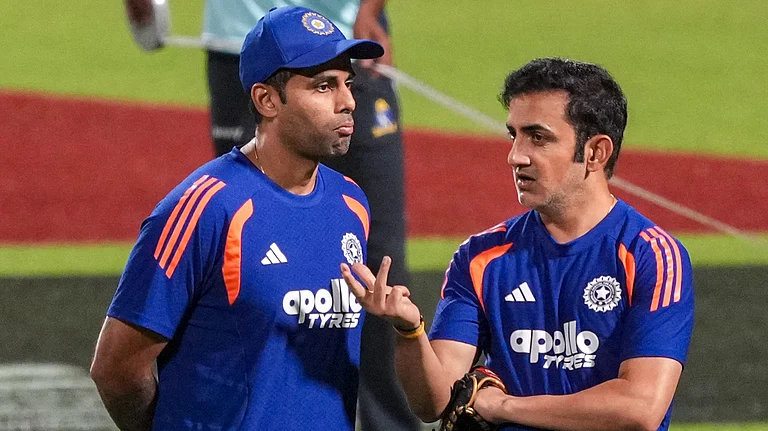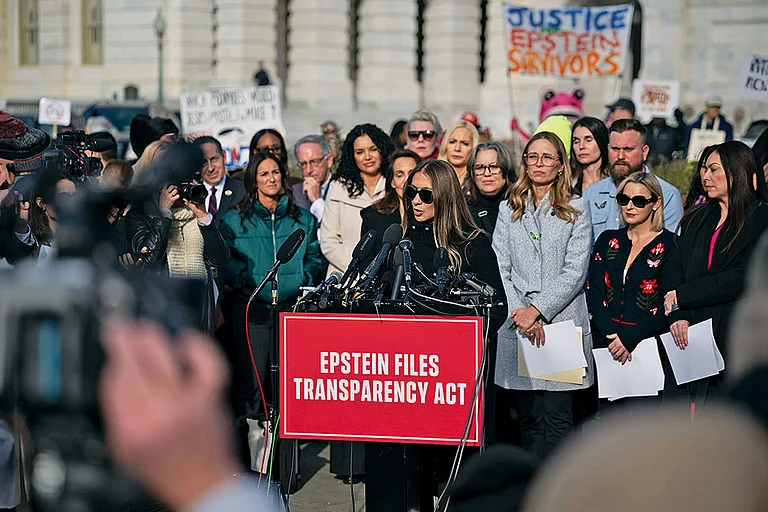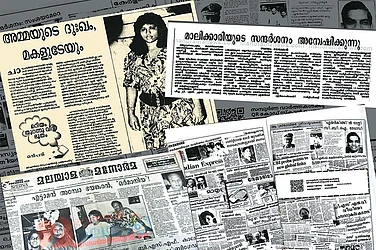Dawood Ibrahim's total stake in the international narcotics trade is Rs 2,000 crore. The operations are controlled through Dubai by Iqbal Mirchi, Iqbal Moosa, Anis Ibrahim, Sharad Shetty, Haji Ismail and Navid Khan.
THOUGH he is under the care of the ISI, far away from Mumbai in Karachi, Dawood Ibrahim and his 'D Company' have once again emerged as the most feared underworld outfit in the country's commercial capital. Contrary to the claims of the Mumbai police, India's public enemy No 1 and his men, who were marginalised after Dawood emerged as the prime accused in the 1993 bomb blasts, are not only back in the reckoning but their business has been steadily growing. With international trafficking in heroin and arms smuggling as its core business, the D Company's operations, according to intelligence reports, now stretches across Asia, western Europe and west Africa.
The D Company's headquarters are in Karachi, its operations base is Dubai and Mumbai is its conduit for heroin. Which is not to underestimate its hold on Mumbai, for it is the most cash-rich underworld outfit in the city. According to intelligence agencies, Dawood's annual stake in the international trade in narcotics alone is about Rs 2,000 crore. Flush with funds, Dawood's local operators have been able to pay off officials and continue with the now lesser priority, though well paying, areas of D Company operations: extortion, film financing, supari killing and hawala. The money from these operations is often ploughed back into the narcotics trade.
Interestingly, four years ago Dawood was virtually written off. After his hand in the 1993 blasts stood exposed, his men were hounded by the law enforcement agencies. His most trusted lieutenant, Chotta Rajan, left him and struck out on his own. D Company henchmen in Mumbai like Bhai Thakur were in the police net and those opposed to Dawood in the underworld like Arun Gawli vowed to take him on. The death knell was being sounded for his operations.
But the D Company is back in business. After four years, the government has failed to extradite him from Dubai. Many of the accused in the bomb blasts case are out on bail. The Company has used its financial resources from the international trade in narcotics to revive itself. First it started investing in the construction trade. Then it extorted money from the builders. Soon it was the turn of the film industry. With producers rushing to the Bhai for help it did not take long for Anis and Abu Salem to rub shoulders with the stars. The parties in Dubai which had come to a halt after the blasts were revived.
Helping Dawood's men revive their activities has been the Sena-BJP government's crackdown on Arun Gawli, Dawood's self-proclaimed enemy. Gawli, who is also into extortion rackets and retailing drugs in Mumbai, has been virtually hounded by the city police. A dozen of his men have been killed in police encounters in recent months.
With Gawli under police pressure, the Ashwin Naik gang, which is said to be close to senior Sena leaders, has revived itself in central Mumbai. It hopes to take over the Gawli territory. The buzz in the underworld is that the Naik company has struck a deal with Dawood's men whereby neither will intrude into the other's activities. With this the D Company is likely to spread its tentacles further.
While the recent killing of Gulshan Kumar has spread terror in the city, police officials monitoring the D Company are also concerned about intelligence reports that Dawood has found a comrade in the arms and narcotics trade in the LTTE. Though the Narcotics Control Bureau (NCB) is yet to pin a drug smuggling charge on Dawood, it believes that the Karachi-based don has tied up with the LTTE and is tapping the contraband drug markets in France, Austria, Netherlands, Germany and the UK (see chart).
Only a minuscule percentage of the heroin routed through Mumbai by the D Company actually seeps to the street pushers. Dawood's men have virtually moved out of the retail market, leaving it to smaller gangs. But though they don't sell the drug locally, the tie-up with the Tamil Tigers and the support extended to Dawood's men by Pakistan's ISI is cause for concern. Points out a senior police official: "Should the ISI plan another operation like the '93 blasts, it can use the LTTE-Dawood network." According to him, the link with the Tigers has also left local operators better equipped with sophisticated weaponry. Among the underworld, only the D Company uses AK-56s and automatic rifles.
Intelligence agencies trace the partnership with the Tigers to September 1994, when the ISI first started dealing with Kumaran Padmanabha (KP), chief procurer of arms for the LTTE. His help was sought to supply arms for anti-India activities from Karachi. Dawood, who reportedly enjoys the protection of the ISI, began his dealings with the LTTE soon after. Trafficking refined heroin, which fetches up to Rs 1 crore per kg in European markets, became the new thrust area for the D Company. Besides, Karachi, apart from inherent logistical advantages, is one of the few places in the world where open processing of opium, which is easily obtained from the fields in the North West Frontier Province, is carried out to produce heroin.
Intelligence reports now confirm that KP—who travels to Pakistan on an assumed Muslim name—has established a permanent base in Karachi, for supplying both arms and narcotics across the world. In fact, an IB report confirmed that the LTTE had supplied a huge cache of arms to Afghan leader Ahmad Shah Masood Khan in 1995 through the port city.
Today, insiders say, Dawood is a major player in the global narcotics trade. And he owes a large part of his success to the LTTE. For, apart from assisting him in transiting narcotics abroad, the LTTE has also helped Dawood streamline operations in India through its bases in the south (the coastal areas of Tuticorin and Thanjavur) and in the west (Mumbai and the creeks of Gujarat). Ironically, the entire maze of operations is so complex—with at least four layers of middlemen who take orders and transport consignments—that not even a single known transaction can be traced to Dawood.
What really makes it difficult for the investigating agencies to track a big heroin sale is the fact that most of the deals are struck in Dubai, not Mumbai. So intelligence has to be active abroad to even scent a deal in the making. Since such monitoring is not being done, the drug traders are at an advantage. Once the deal is struck, the drug is procured in Karachi and sent across the Gujarat border. This route is chosen since Karachi port is closely monitored by international agencies cracking down on the narcotics trade and because the desert belt that separates India and Pakistan has long stretches where intensive surveillance is not possible because of the rough terrain.
Once in Gujarat, the drug is transported to Mumbai and then abroad through what DCP S. Kakkar of the city's narcotics cell calls "ingenious methods".Among the techniques used is sorting the heroin in 1-2 kg waterproof packets and loading it into milk trucks or oil tankers. It is not very often that milk tankers are emptied to look for contraband. Once near Mumbai, the packets are pulled out and the D Company network takes over and the heroin is sent abroad either through containers in ships or on mafia boats from the coast near Mumbai.
According to NCB figures, the annual heroin seizures in the country are about one tonne. But this accounts for only a fraction of the drug that passes through. That the trade in narcotics is lucrative is clear from the fact that, as per NCB estimates, 1 kg of heroin which costs Rs 2 lakh in Pakistan could finally fetch Rs 1 crore in the international market. Even with a chunk of the money being paid to officials both in India and abroad, the net profit far exceeds the margins that were made through the gold trade.
In terms of logistics, Dawood's narcotics business is like a smoothly run export company, with representatives, agents and subagents across the globe. The operations are quite complex. After a deal is struck—either in Dubai or Karachi—the consignments are packed and sent to Gujarat, then to Mumbai. From Mumbai, the cargo can go in two directions: either to the coastal areas of Tamil Nadu, to be forwarded to LTTE dealers in Colombo and then diverted to west European countries on ocean liners; or on cargo-carriers to western Africa, where Nigeria and Ghana provide ready markets.
The LTTE link has often come to the fore. This May, for example, the Mumbai police nabbed Harish Bishnoi and Mannivannan Mahadevan alias Rubon with 23 kg of heroin, worth Rs 23 crore. On interrogation it was revealed that the drug was to be shipped to Canada, that Bishnoi was acting on instructions from Karachi and that Rubon was a Sri Lankan national with suspected LTTE links. Last year a 37.5 kg heroin haul from a vessel at Negombo near Colombo was reportedly from Tamil Nadu across the Palk Straits. The Sri Lan-kan Narcotics Control Bureau had alerted its Indian counterparts on the possible link between the LTTE and the mafia in Mumbai.
INDEED, a Sri Lankan Tamil presence in Mumbai is nothing new. According to reliable sources, even in the '80s Tamil militants belonging to various groups camped in the city. However, today the LTTE operatives have not come to seek shelter or to conduct marginal deals in heroin. Intelligence reports speak of the LTTE having addresses in Colaba's Pasta Lane and in the Lokhandwala Complex in the western suburbs. It is also learnt that LTTE men run travel agencies in south Mumbai and that these are actually a front from where the heroin and arms trade is monitored. According to underworld sources, the LTTE even conducted a training camp for the D Company on innovative ways of packing heroin. Packaging has moved on from false-bottom suitcases to scooping out oranges and filling them with heroin to packing the drug in fruit tin cans and embroidered strips on salwar kameezes. A bulk of the contraband is sent by sea in cargo containers. As a result of which many export-import agencies have been set up in Mumbai by Dawood's men.
That Dawood remains the elusive epicentre of the network is absolutely clear. This, despite the fact that the pressure by Indian agencies has forced him to go virtually underground, leaving the charge to younger brother, Anis. Anis works as the classic frontman for Dawood—operating from a spacious office at Pearl Building in Deira, Dubai—and takes telephonic orders for consignments and fixes deals—all with the tacit nod of Dawood in Karachi. Incidentally, it is now Anis who supervises the India operations in extortion and financing of films and construction in Mumbai. But the D Company network is not limited to the family alone. Intelligence reports list other key operators in Dubai who take orders from Dawood in the narcotics trade. Prominent among these are Navid Khan—who runs the Al Man shopping centre in Dubai—Haji Ismail, Sharad Shetty, Vicky Goswami, Iqbal Moosa, Iqbal Mirchi and Chhota Shakeel.
IN Tamil Nadu shipping companies owned by an LTTE operative known as Capt David, who is also KP's main contact in the south, provide the mechanism for transporting the narcotics to Colombo. But it is in Europe that Dawood has benefited most from his tie-up with the Tigers—who have both resources and a wide network all over the world. In France, for instance, Patrick Condier, a retired army officer and international dealer in arms and drugs, is an old-time ally of KP. Reports now show that Dawood, too, is using this contact to market heroin by offloading it at Marseilles.
In the UK—where Dawood has been operating since the early '80s—the D Company doesn't rely on the Tigers. Umarji Moosa Patel, an old-time Dawood ally, supervises the operations in London, taking telephonic instructions directly from Dawood in Karachi. This, despite the fact that Umarji is wanted by the NCB and the UK authorities have responded to a letter rogatory moved by the Indian government. The global operations, however, do not work in isolation. According to intelligence reports, there is constant interaction between Dawood's representatives across continents, both on telephone and through sophisticated wireless sets. In Germany, for instance, Sooriyakumar Selvadurai, an LTTE agent based in Dusseldorf, coordinates with Umarji for cargo coming into the UK and having it transported to the continent.
The D Company does not survive on narcotics alone. In Mumbai it has continued its interests in financing films and running the extortion racket. With all his lieutenants, including brother Anis, Abu Salem and Chotta Shakeel, in Dubai, how does Dawood still continue to control the Mumbai mafia? Much has been said about Dawood's remote control operations, but a section of police officers point out that an operation on the scale that the D Company has cannot be run with the help of a few sharpshooters.
According to underworld sources, the Mumbai operations have been divided into a dozen zones and each is being run not by any known underworld operator, but by local businessmen trusted by the company. They have legitimate business in Mumbai and have links among politicians and a section of the police. It is these handful of trusted representatives who strike various deals for Anis, Abu Salem and even Dawood. The police however claim to have no inkling about the representatives of the Company. Besides, Dawood has over the years provided finance to his operatives to set up legitimate business in the city. So there are travel agents, exporters and those running STD booths across the city who are obliged to the company.
Like the narcotics deals, assignments taken on in Mumbai cannot be tracked down to a particular source since they go through layers of middlemen. And more often than not, minor extortions and killings are carried out locally without approval from Dubai or Karachi. These crimes are committed to sustain local boys of the outfit and the money made is used in Mumbai and not funnelled out. Since hired killers from Uttar Pradesh are used, the culprits flee the city and the police merely arrest underlings of the Dawood gang.
Indeed, cracking the D Company requires political will. In the aftermath of the 1993 blasts, the activities of the gang, at least within Mumbai, had ground to a halt. The public demand then was that the police be given a free hand. The D Company could perhaps have not revived itself to the extent it has without the police turning off the heat.


























